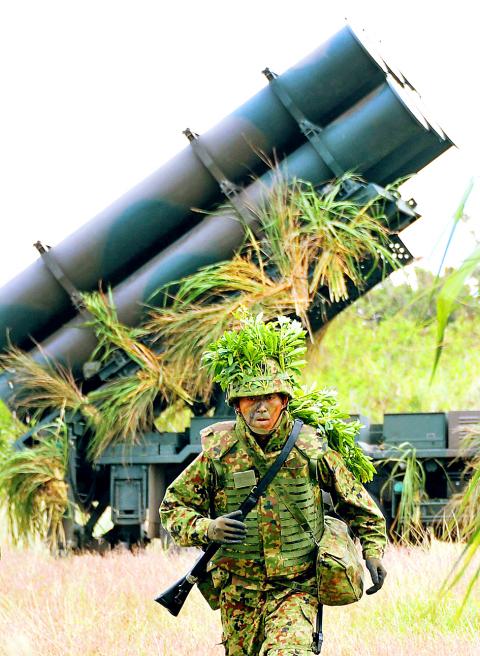Japan yesterday warned that China’s “dangerous acts” over territorial claims in the East China Sea could lead to “unintended consequences” in the region, as fears grow of a potential military clash.
The annual defense white paper was adopted by Japanese Prime Minister Shinzo Abe and his ministers at a Cabinet meeting, heaping criticism on Beijing’s unilateral declaration of an air defense identification zone (ADIZ) late last year.
The zone sparked regional criticism, as well as condemnation from Washington, while commentators voiced concern over the growing chances of an armed conflict between the two Asian powers.

Photo: AFP
Tokyo’s paper, which noted that China’s military budget had quadrupled over the past decade, said Japan was seeing an “increasingly severe” security environment.
“Japan is deeply concerned about the establishment of ‘the East China Sea ADIZ’ which is a profoundly dangerous act that... escalates the situation and may cause unintended consequences,” the 505-page paper said.
Chinese vessels and aircraft have regularly approached an East China Sea archipelago which is believed to harbor vast natural resources below its seabed and is claimed by both countries after Tokyo nationalized three of the islets in 2012.
The islets are called the Senkaku Islands by Japan, the Diaoyu Archipelago (釣魚群島) by China and the Diaoyutai Islands (釣魚台) by Taiwan, which also claims them.
In a June confrontation, Tokyo said that two Chinese fighter jets flew within 30m of its aircraft in an area where the two nations’ air defense zones overlap.
Beijing responded that it was Japanese military planes that flew dangerously close to its aircraft. China has also laid claim to much of the South China Sea, angering Vietnam, the Philippines and other Southeast Asian nations.
“In regard to conflicts over maritime interests, China has adopted assertive measures, including attempting to alter the status quo by coercive measures... which is incompatible with the existing international law and order,” the paper said. “These measures include dangerous acts that could cause unintended consequences and raise concerns over China’s future direction.”
Tokyo’s paper also warned that an unpredictable North Korea “repeatedly uses militarily provocative words and actions.”
“Military trends in North Korea constitute a serious destabilizing factor to the security not only of Japan, but of the entire region and the international community,” it said.
Japan’s military budget had been on the decline since 2002, but it has taken an upward turn, rising 2.2 percent in the current fiscal year, the paper said.

Seventy percent of middle and elementary schools now conduct English classes entirely in English, the Ministry of Education said, as it encourages schools nationwide to adopt this practice Minister of Education (MOE) Cheng Ying-yao (鄭英耀) is scheduled to present a report on the government’s bilingual education policy to the Legislative Yuan’s Education and Culture Committee today. The report would outline strategies aimed at expanding access to education, reducing regional disparities and improving talent cultivation. Implementation of bilingual education policies has varied across local governments, occasionally drawing public criticism. For example, some schools have required teachers of non-English subjects to pass English proficiency

‘FORM OF PROTEST’: The German Institute Taipei said it was ‘shocked’ to see Nazi symbolism used in connection with political aims as it condemned the incident Sung Chien-liang (宋建樑), who led efforts to recall Democratic Progressive Party (DPP) Legislator Lee Kun-cheng (李坤城), was released on bail of NT$80,000 yesterday amid an outcry over a Nazi armband he wore to questioning the night before. Sung arrived at the New Taipei City District Prosecutors’ Office for questioning in a recall petition forgery case on Tuesday night wearing a red armband bearing a swastika, carrying a copy of Adolf Hitler’s Mein Kampf and giving a Nazi salute. Sung left the building at 1:15am without the armband and apparently covering the book with a coat. This is a serious international scandal and Chinese

TRADE: The premier pledged safeguards on ‘Made in Taiwan’ labeling, anti-dumping measures and stricter export controls to strengthen its position in trade talks Products labeled “made in Taiwan” must be genuinely made in Taiwan, Premier Cho Jung-tai (卓榮泰) said yesterday, vowing to enforce strict safeguards against “origin laundering” and initiate anti-dumping investigations to prevent China dumping its products in Taiwan. Cho made the remarks in a discussion session with representatives from industries in Kaohsiung. In response to the US government’s recent announcement of “reciprocal” tariffs on its trading partners, President William Lai (賴清德) and Cho last week began a series of consultations with industry leaders nationwide to gather feedback and address concerns. Taiwanese and US officials held a videoconference on Friday evening to discuss the

PERSONAL DATA: The implicated KMT members allegedly compiled their petitions by copying names from party lists without the consent of the people concerned Judicial authorities searched six locations yesterday and questioned six people, including one elderly Chinese Nationalist Party (KMT) member and five KMT Youth League associates, about alleged signature forgery and fraud relating to their recall efforts against two Democratic Progressive Party (DPP) legislators. After launching a probe into alleged signature forgery and related fraud in the KMT’s recall effort, prosecutors received a number of complaints, including about one petition that had 1,748 signatures of voters whose family members said they had already passed away, and also voters who said they did not approve the use of their name, Taipei Deputy Chief Prosecutor